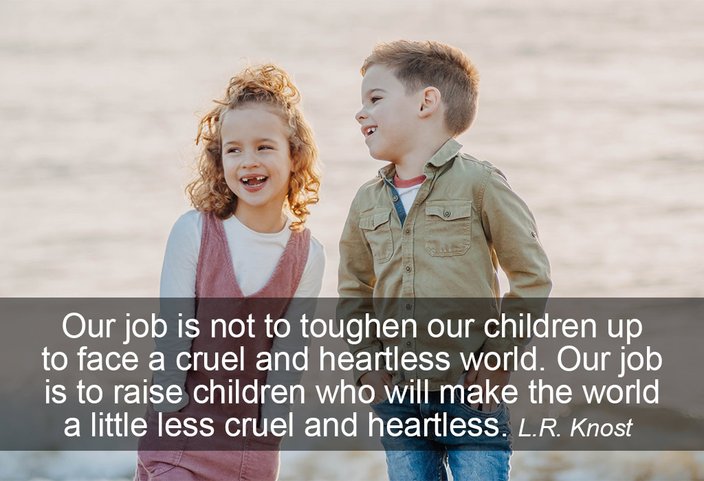
June 13, 2018
I watch a family play soccer at a nearby park.
On the surface, it’s a beautiful sight. Mother, father, and sons kick a black and white ball around. The boys laugh. The parents do some fancy foot work, evoking more laughter. I smile.
From my vantage point, I occasionally hear snippets of conversation. “Great kick honey.” “I got you this time.” “Here dad, the ball is yours!”
Then at one point, the youngest son dives to pick up the ball — goalie style. Unfortunately, the father’s foot is in the way and the child is kicked in the head. “I didn’t kick him hard,” I hear the father firmly state. “It was really nothing.”
Yet, the child is crying. He’s around 5 years old. The child holds his forehead with both hands and rolls around on the ground.
I watch the mother instinctively and quickly walk toward her son. She is ready to check in, offer comfort, and assess damage done. The child reaches for her. I can tell by her face, she’s concerned. The older boy moves closer, too. “You OK, bro?”
“We’ve got to stop this,” the father says loudly. He doesn’t move toward anyone. He just stands still.
Stop what? I wonder.
“We’ve got to stop this,” he repeats. The mother looks at him a bit incredulously. Then I see she makes an effort to ignore him. She returns her focus to the boy. The father continues: “I didn’t kick him hard. He’s got to stop crying. It’s embarrassing. We’ve got to stop this.” Then he turns to his wife, “You’ve got to stop this.”
Is he kidding? Did this husband just ask his wife to make their youngest child cry-proof?
I turn my attention away from the family, feeling guilty for having watched too much of their internal dynamic. I think of my own son and what I would feel if I were asked to “stop” his natural instinct to cry should he ever get kicked in the head by an adult. And even if the kick was “really nothing,” the boy clearly had a strong emotional reaction. That should be a sign to his parents that he’s carrying around some powerful sadness in his proverbial “emotional backpack” — a term used by Dr. Laura Markham, founder of Aha! Parenting, when describing the emotional energy we all carry with us even when we are very young.
I carry the story of the soccer playing family with me and I think of the work of filmmaker and educator Jackson Katz. In his documentary, “Tough Guise,” Katz offers a searing critique of the suffocating cultural box that we label as “masculine” and condemn our boys to live within. How I wish I could have transported Katz into that soccer playing moment. For certainly he would have a great deal to say about the father who wants his wife to “stop” his son from crying.
I imagine taking the mother aside to reassure her. Your instinct to check in, nurture, comfort, assess your child’s well being — it’s all good. Trust that wise heart, mama. I imagine taking the father aside to listen. What was his own childhood experience like with father figures and sports? I’d bet money as a boy he was made fun of for crying by well-meaning but emotionally stunted men. The fact that he didn’t offer an apology or check in with his son indicates how powerfully his own past was triggered. For clearly, if we kick someone in the head by accident, our first response shouldn’t be to justify or minimize, but to connect, apologize, and repair. I think of the older brother and his instinct to protect. How to preserve this instinct? Certainly, we want our older children to care for and protect the more vulnerable amongst us.
Most importantly, I turn my attention within. For it is far easier to engage in cultural critiques or offer solutions to others, than it is to internalize wisdom and live true to it in one’s own life. I wonder, in what ways do I speak about my son as if he weren’t present? I think of how it felt for the boy to be “talked about” by his father in such a disparaging way. I wonder, in what ways do I try to minimize my own behavior when I harm another? I consider when I get lost in my own justifications and fears.
Fears.
As I walk, I make a promise to myself to continue the journey of examining and owning my own fears. If something was difficult for me as a child, let me examine the echoes of that in my own life and not feel “embarrassed” should my child appear to struggle with the same situation. He may very much react to it differently, as may the adults around him. My childhood experience is my own, not to be projected full force on my son.
Finally, the words of the wise, gentle, and always insightful author L.R. Knost come to mine. I’ll let the final words of this reflection be her own. In honor of that little boy’s tears, may we remember the following:
Interested in Amy Wright Glenn's work? Sign up for Amy's email newsletters today.
Follow Amy on Twitter @AmyWrightGlenn
Add Amy's RSS Feed: Amy Wright Glenn
 PhillyVoice illustration/Photo by Emma Goldsmith on Unsplash
PhillyVoice illustration/Photo by Emma Goldsmith on Unsplash